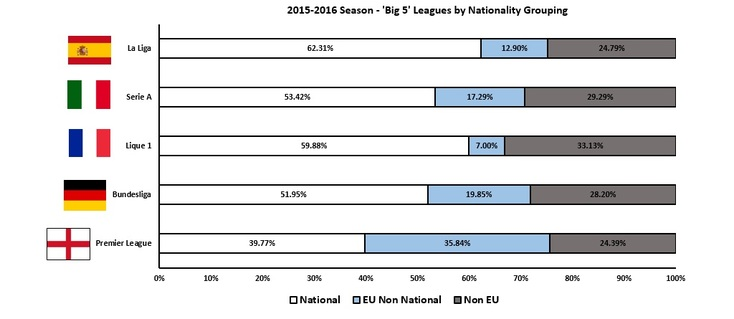The vote on whether the UK should remain in the European Union will take place on Thursday 23rd of June 2016. The "In" side appears in control as they currently trade at odds of 1/7 with bookmaker Paddy Power to win the vote. These odds are obviously subject to change. One external shock could be England's performance at Euro 2016. England play their final group game in Saint-Étienne three days earlier. Commentators have suggested that a positive performance by the team during the group stages is more likely to see people vote to remain in the EU.
While I doubt the impact of England's Euro 2016 will be in any way sizeable, the possibility of Brexit would have consequences for the English Premier League. Last week David Butler discussed the origins of players within the "Big 5" leagues in Europe and presented the graphic below.
The stats make for very interesting reading.
Should the UK decide to leave the EU the implications for 35.84% of players could be big. The free movement of labour with EU borders would no longer apply to these players and they may not be eligible to earn a living in the UK due to visa restrictions.
Additionally, in theory, the Bosman ruling will no longer apply. This ruling was passed by the European Court of Justice in November 1995. Under EC Treaty Article 45 (1) of the Treaty on the functioning of the European Union, all EU football players are permitted to move freely at the end of their contracts, with the provision that they are transferring from a club within one EU Association to a club within another EU Association. The UK will no longer be covered by this provision. While players refused a move following the expiry of their contract will probably challenge this in the High Court, it will lead to legal battles and uncertainty.
The wider implications for UK/EU trade will require the establishment of bilateral agreements between the EU and UK, much in the same as Switzerland and Norway. The Football Association and the Home Office will need to do something similar and create new work permit rules to allow for EU imports.
We may also head back to the days of the "Three Foreigners Rule". For those of us old enough to remember, the 1994-1995 season was the last when only three non-national players could represent a team at club level. For example, Alex Ferguson had to juggle Peter Schmeichel, Denis Irwin, Andrei Kanchelskis, Eric Cantona and Roy Keane, with two players often missing out in European football games simply because they weren't English. There is nothing to suggest this would return but it would be possible under Brexit.
Added together, these changes could have a sizeable impact on the Premier League. That said, those advocating a "Leave" vote might hark for a return to the days of English players predominately appearing in their national league.
Back in 1995 Gordon Taylor, chief executive of the Professional Footballers' Association said "I think this (end of the Three Foreigners Rule) will lead to a flood of foreign players coming here, which I believe will be to the detriment of our game. The only way to control the number of imports will be to ban non-European footballers from competing here." Taylor was somewhat correct, but the the foreigner arrivals have been largely from the EU not outside of it. Brexit, should it happen, will no doubt have the desired effect.

 RSS Feed
RSS Feed